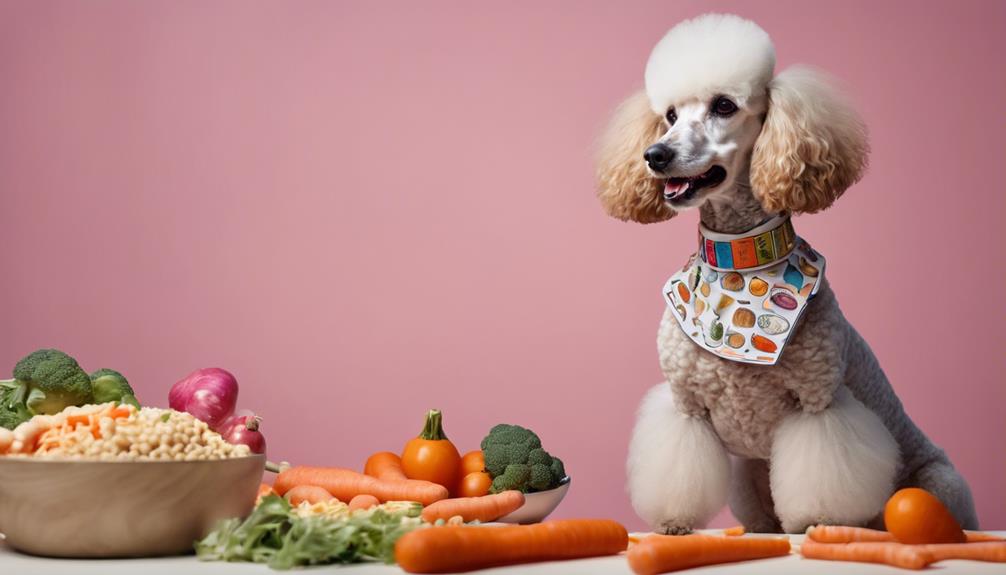When it comes to fueling the active lifestyle of your Poodle, the right diet can make all the difference. Imagine the impact of tailored nutrition on your furry companion's vitality and performance. But what specific dietary considerations should you bear in mind to optimize your active Poodle's health and well-being? Let's explore the key elements that can keep your Poodle in prime condition for all those adventures and playtime sessions.
Key Takeaways
- Tailor diet to support high energy needs and muscle maintenance
- Provide lean proteins for muscle development and repair
- Monitor weight and balance diet for optimal health
- Ensure proper hydration to prevent fatigue and muscle issues
Poodle Energy Requirements
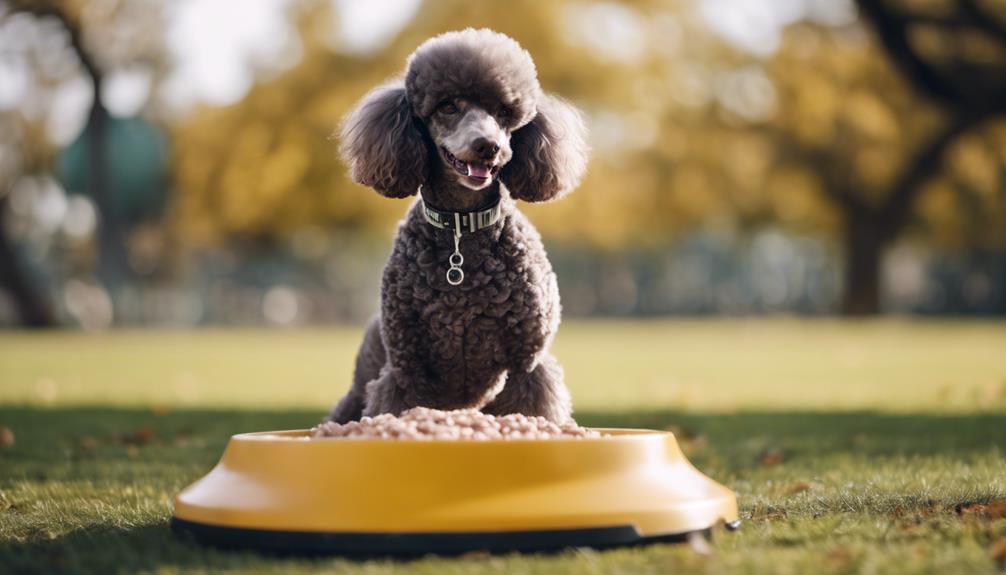
To meet the high energy demands of active Poodles, it is essential to tailor their diet to support their rigorous exercise routines. Active Poodles engaging in physical activities like agility or running have increased energy needs. Their diet should be rich in calories to fuel these activities. Adequate carbohydrates are crucial as they provide a quick source of energy for the active Poodle. Essential fats play a vital role in sustaining energy levels during prolonged exercise sessions. Hydration is key to supporting the performance of active Poodles and preventing dehydration, especially during strenuous activities. Ensuring your Poodle's diet meets their energy requirements is fundamental in maintaining their health and optimizing their physical performance. Consulting a vet to adjust their diet based on their specific energy and nutritional needs will help support their overall well-being and ensure they have the energy to thrive in their active lifestyle.
Protein Needs for Active Poodles
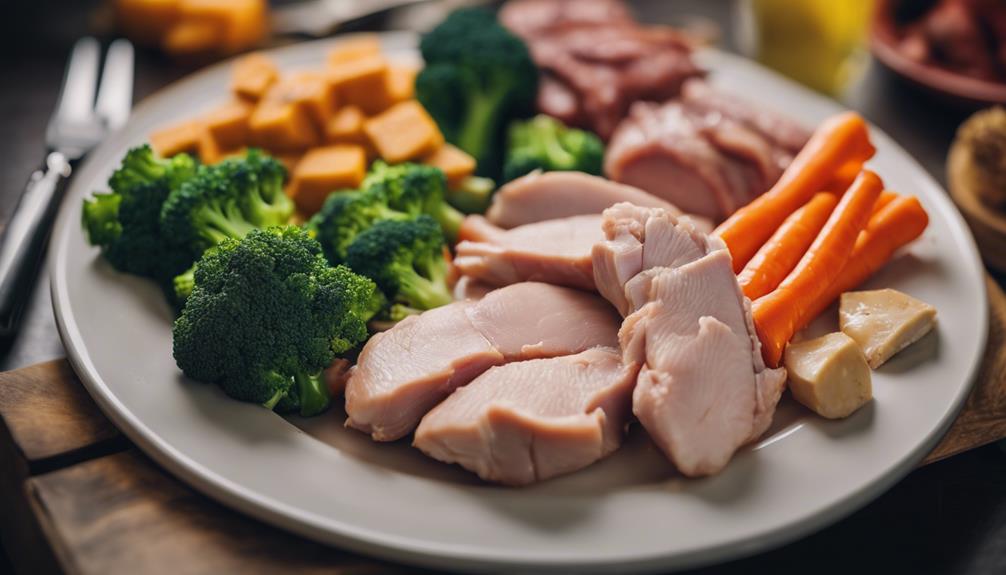
For active Poodles, maintaining protein levels at around 22-25% is crucial to support muscle maintenance and repair. Protein plays a vital role in providing the necessary building blocks for muscle growth and repair, essential for sustaining the energy and performance levels of active Poodles. Sources such as lean meats, fish, and poultry are excellent choices to fulfill these protein needs effectively.
Incorporating high-quality protein into the diet of active Poodles aids in enhancing stamina, allowing them to engage in physical activities for more extended periods. Moreover, adequate protein intake contributes to quicker recovery after strenuous exercise or agility training sessions. Tailoring protein-rich diets to meet the individual needs of active Poodles based on their activity levels and performance demands is essential for optimizing their overall health and well-being.
Essential Fats for Poodle Activity

Supporting the muscle maintenance and repair of active Poodles, essential fats like Omega-3 and Omega-6 play a vital role in providing energy and promoting overall endurance during high-intensity activities. These fats are not only essential for energy but also crucial for joint health, mobility, and reducing inflammation in your active Poodle's body. Omega-3 fatty acids specifically contribute to cardiovascular health, aiding in your Poodle's overall well-being. Including sources of healthy fats such as fish oil or flaxseed oil in your Poodle's diet can significantly enhance their performance and recovery. Ensuring the right balance of essential fats in your Poodle's meals will not only support their activity levels but also lead to shiny coats and healthy skin. By prioritizing these fats in your Poodle's diet, you are taking a proactive step towards maintaining their health and activity levels for years to come.
| Essential Fats | Benefits |
|---|---|
| Omega-3 | Joint health, cardiovascular health, reduced inflammation |
| Omega-6 | Energy, endurance, mobility, shiny coats, healthy skin |
Carbohydrates for Poodle Stamina
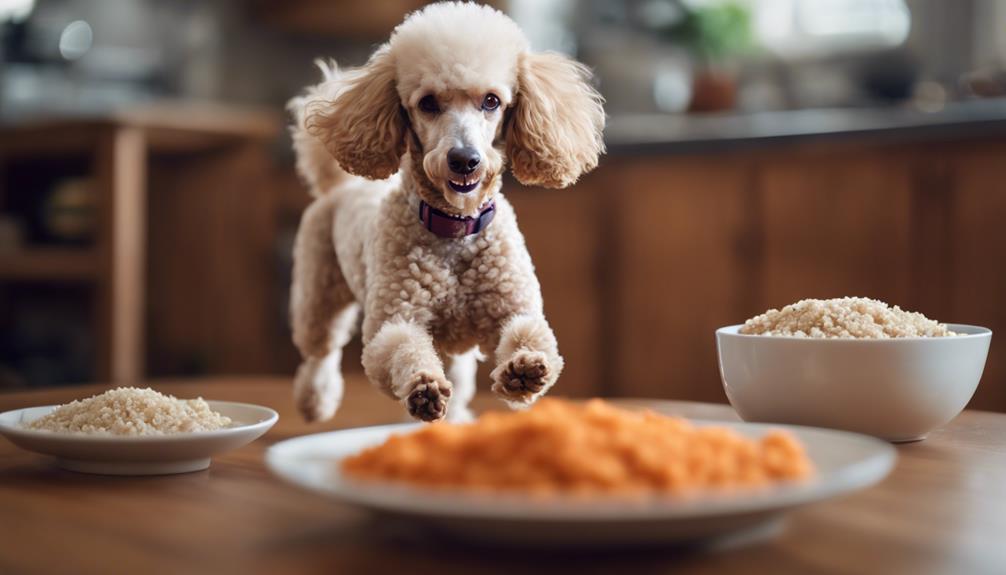
Active Poodles rely on carbohydrates like sweet potatoes and brown rice to sustain their energy levels during physical activities. These complex carbohydrates serve as essential muscle fuel, providing the necessary stamina for your Poodle to endure extended playtime and exercise sessions. By including digestible sources of carbohydrates in their diet, you support their endurance and overall performance. Optimal carbohydrate intake ensures that your active Poodle maintains adequate energy reserves for prolonged periods of activity. Balanced carbohydrate sources not only help in maintaining stamina but also aid in efficient recovery post-exercise. It is crucial to consider the quality and quantity of carbohydrates in your Poodle's diet to ensure they have the sustained energy needed to keep up with their active lifestyle. Remember, proper carbohydrate consumption plays a vital role in enhancing your Poodle's stamina, endurance, and recovery process.
Vitamin Support for Active Poodles
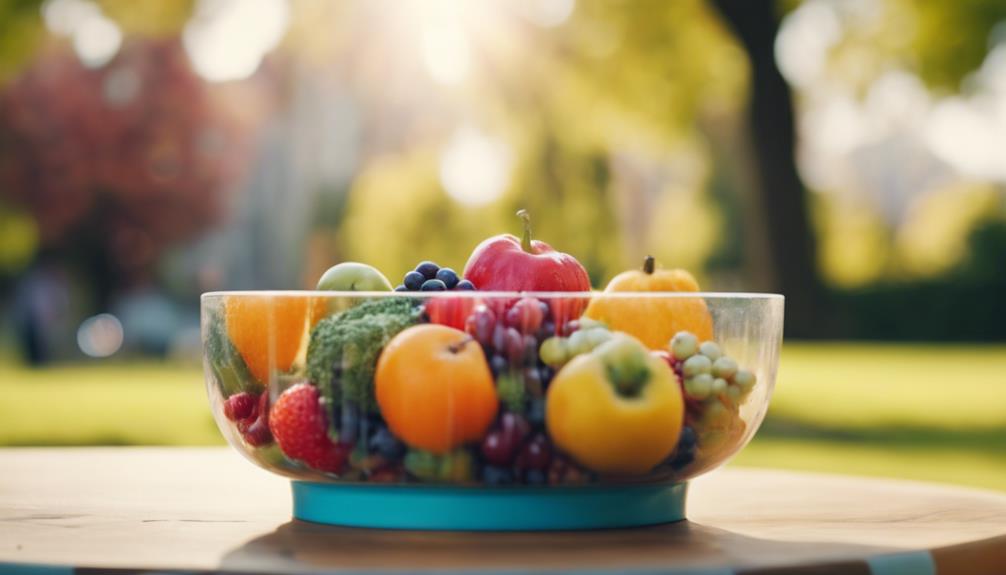
To sustain the energy levels and overall performance of your active Poodle, consider incorporating essential vitamins such as vitamin C, E, B complex, and D into their diet for optimal health and enhanced physical capabilities. Vitamin C plays a vital role in supporting the immune system of active Poodles, reducing exercise-induced stress and promoting overall well-being. Vitamin E is crucial for muscle recovery, inflammation reduction, and improved performance post-activity. Active Poodles benefit from vitamin B complex to enhance energy production, maintain nerve function, and support red blood cell formation, all essential for their active lifestyle. Additionally, vitamin D is essential for bone health, muscle function, and overall performance during physical activities. Adequate intake of these vitamins is fundamental for active Poodles to maintain optimal health, sustain energy levels, and enhance their performance levels while engaging in their active endeavors. Prioritizing these vitamin supports will ensure your Poodle remains healthy and active for years to come.
Mineral Considerations for Activity
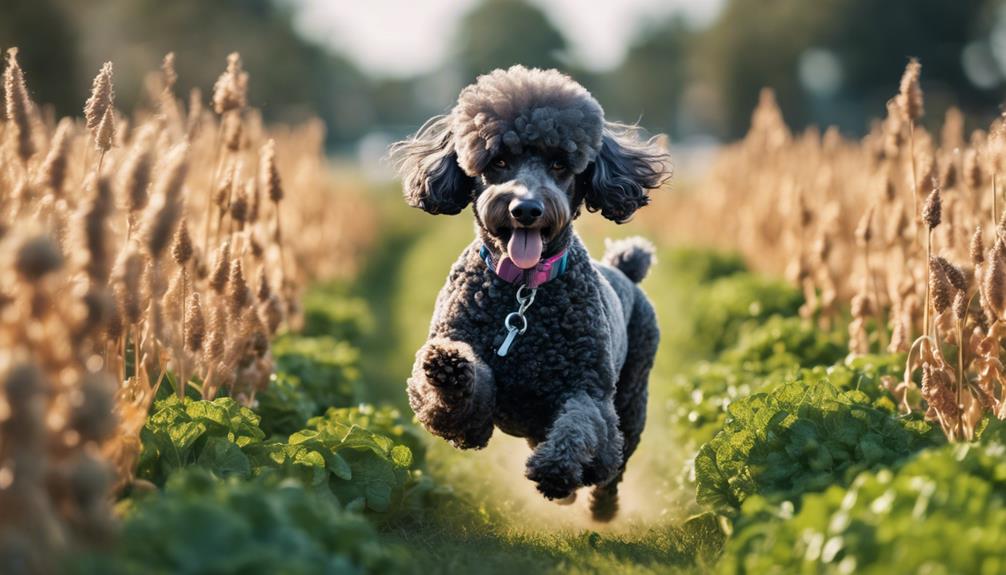
During periods of high activity, ensuring adequate mineral intake is crucial for maintaining the strong bones, muscle function, and energy metabolism of active Poodles. Here are some key mineral considerations for your active companion:
- Calcium: Essential for strong bones and muscle contraction, calcium plays a vital role in supporting overall performance during intense activities.
- Phosphorus: Critical for energy production, bone health, and cell function, phosphorus is indispensable for highly active Poodles to sustain their energy levels.
- Potassium: Necessary for nerve function and muscle contractions, potassium aids in maintaining electrolyte balance during strenuous physical exertion.
Hydration for Active Poodles
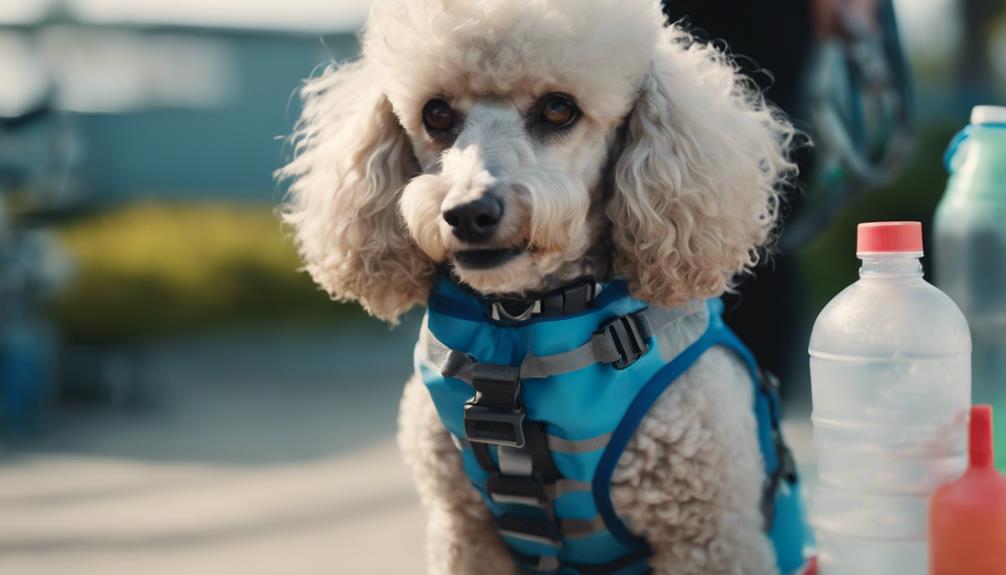
Ensuring proper hydration levels is essential for maintaining the health and performance of your active Poodle, particularly during periods of high activity. Active Poodles require approximately 1 ounce of water per pound of body weight daily to stay adequately hydrated. Water intake is crucial for sustaining energy levels during intense exercise sessions. Hydration also plays a vital role in regulating body temperature, preventing dehydration, supporting joint lubrication, and enhancing muscle function in active Poodles.
Offering continuous access to clean water is paramount for the well-being and optimal performance of your active Poodle. Dehydration can lead to decreased energy levels, impaired joint mobility, and reduced muscle function, negatively impacting your Poodle's overall performance. By prioritizing proper hydration, you can help your Poodle maintain peak physical condition, ensuring they stay healthy, active, and vibrant. Remember, water is not just a basic need but a key component in supporting your Poodle's active lifestyle.
Special Diet for Poodle Muscles
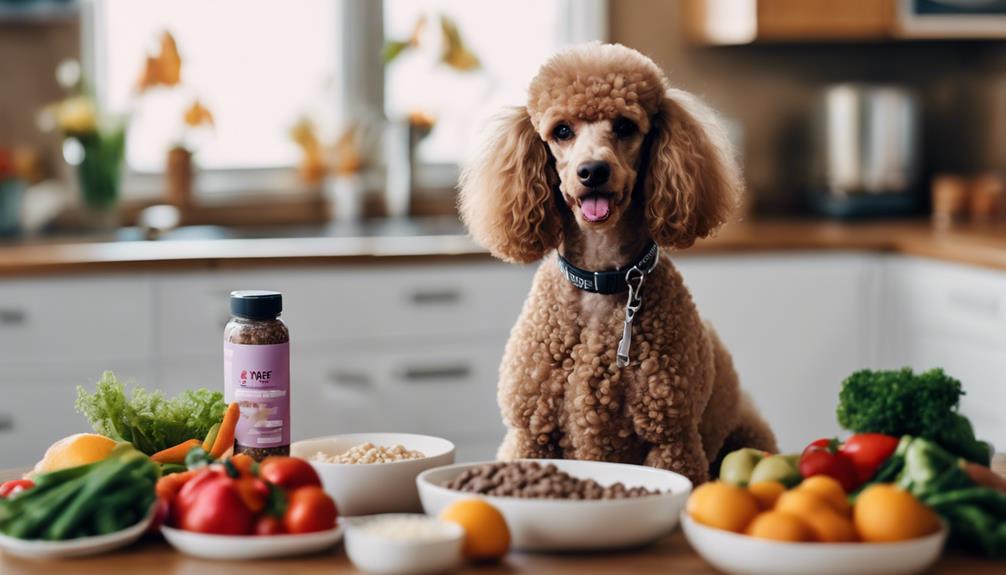
For optimal muscle development in your active Poodle, prioritize a diet rich in quality proteins such as chicken, beef, and fish. Ensuring your Poodle receives the right nutrients is essential for supporting their muscle growth and overall physical performance. Here are some key dietary considerations to help your Poodle's muscles stay strong and healthy:
- Include lean proteins like turkey, salmon, and lamb in your Poodle's diet to promote muscle development.
- Ensure your Poodle's food contains essential amino acids from real meat sources for proper muscle repair and growth.
- Protein-rich foods help maintain energy levels, supporting your Poodle's active lifestyle and enhancing their physical performance.
Weight Management for Active Poodles
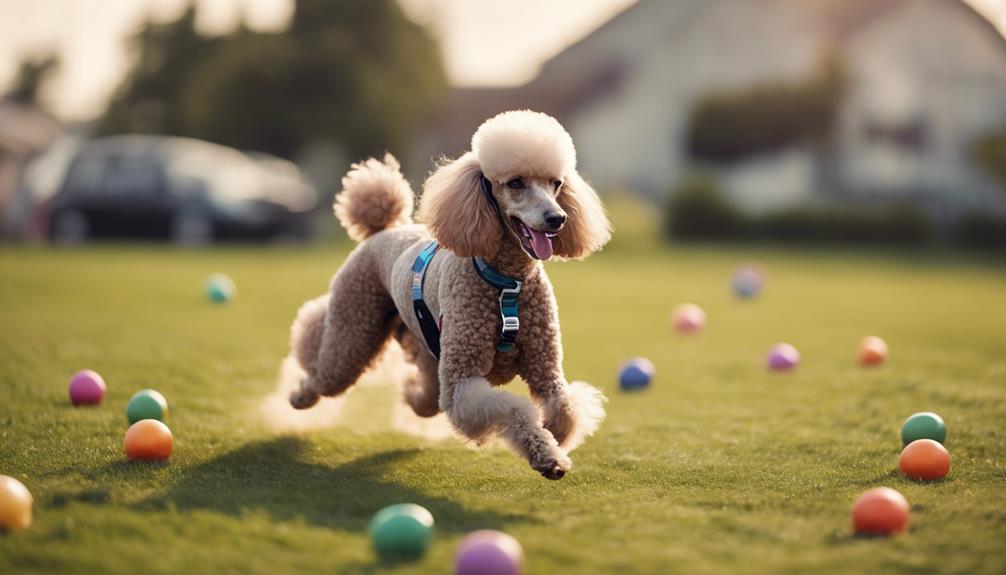
To effectively manage the weight of your active Poodle, focus on maintaining a balanced diet that supports their energy needs and overall health. Active Poodles require careful portion control to prevent weight gain. Monitoring their calorie intake is crucial, as excess calories can lead to obesity. It's important to feed them high-quality, nutrient-dense food to provide essential nutrients without unnecessary additives. Regular exercise is also key for weight management in active Poodles, helping them burn calories and stay fit. Consultation with a veterinarian is recommended to create a tailored diet and exercise plan that suits your Poodle's individual requirements. By combining portion control, nutrient-dense food, and regular exercise, you can effectively manage your active Poodle's weight, ensuring they stay healthy and energetic for all their adventures.
Tailored Diet for Active Poodle Health
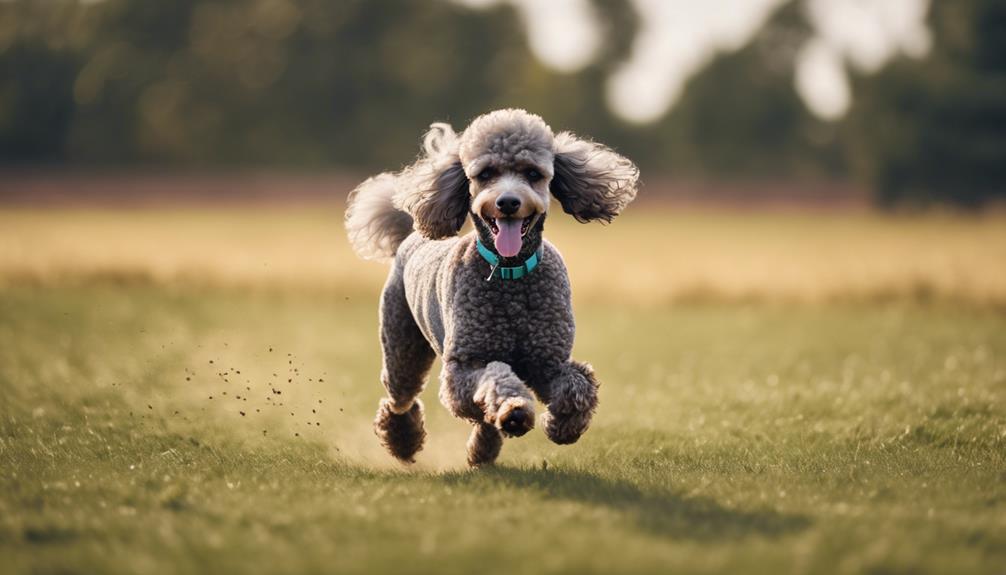
For your active Poodle's optimal health, focus on nutrient-rich food choices that provide high-quality proteins for muscle strength and essential fats like Omega-3 and Omega-6 for stamina and a healthy coat. Hydration is crucial to support your Poodle's activity levels, so always ensure access to fresh water during exercise. Understanding your dog's energy needs for play and exercise is key to tailoring a diet that fuels their activities without causing weight gain.
Nutrient-Rich Food Choices
When selecting nutrient-rich food choices for your active Poodle's tailored diet, prioritize proteins essential for muscle repair and development. Essential fats like Omega-3 and Omega-6 support energy levels and joint health, while complex carbohydrates provide sustained energy for high-activity Poodles. Adequate vitamins and minerals are crucial to support overall health and endurance in active Poodles. Tailoring the diet to match the energy expenditure of your Poodle is essential for optimal performance and health. Remember, a balanced diet rich in proteins, essential fats, complex carbohydrates, vitamins, and minerals will help your active Poodle thrive and stay healthy during all their adventures.
Hydration Importance for Activity
Maintaining proper hydration levels is essential for the optimal health and performance of active Poodles. Active Poodles require increased water intake to support their energy levels and prevent dehydration during exercise. Adequate hydration aids in regulating body temperature, optimizing physical performance, and preventing issues like muscle cramps, fatigue, and heat-related problems. Providing access to clean water before, during, and after physical activities is crucial for keeping active Poodles properly hydrated. Hydration not only enhances overall health but also supports joint lubrication and efficient nutrient transport within the body. Ensuring your active Poodle stays well-hydrated is key to promoting their well-being and helping them excel in their active lifestyle.
Energy Needs for Exercise
To sustain high energy levels during exercise, active Poodles require a tailored diet that focuses on specific nutrient ratios to support muscle maintenance, repair, and overall performance. When considering the energy needs of your active Poodle, keep in mind the following:
- Protein: Aim for around 25-30% of their diet to support muscle maintenance.
- Fats: Include 15-20% of fats for sustained energy during exercise.
- Complex Carbohydrates: Provide sources like sweet potatoes and whole grains to fuel their high energy demands.
Frequently Asked Questions
Do Poodles Need a Special Diet?
You need to ensure a balanced diet for your active Poodle. This includes sufficient protein for muscle maintenance, complex carbs for energy, essential fats for coat health, vitamins for metabolism, and hydration for peak performance.
What Are the Nutritional Needs of a Poodle?
To meet a Poodle's nutritional needs, focus on protein for muscle, complex carbs for energy, Omega-3 and Omega-6 fats for coat health, vitamins/minerals for overall well-being. Tailor the diet to age, size, and activity level.
What Kind of Food Is Best for Poodles?
For active Poodles, high-quality dog food with real meat as the primary ingredient is essential. Opt for protein-rich diets with balanced fats and carbs. Consult a vet to tailor the food to your Poodle's needs for optimal energy and health.
What Can Standard Poodles Not Eat?
You should be cautious with the foods Standard Poodles eat. Toxic foods like chocolate, grapes, and xylitol can trigger allergies, cause digestive issues, and affect weight management. Avoid banned ingredients, table scraps, and harmful treats. Stick to balanced, non-processed, homemade meals.
Conclusion
In conclusion, ensuring your active Poodle has a diet tailored to their energy needs is crucial for their overall health and performance. By providing high-quality proteins, essential fats, complex carbohydrates, and adequate vitamins, you can support their muscle maintenance, stamina, and overall well-being. Remember to monitor their weight, manage portion sizes, and incorporate healthy treats to keep them in top shape. So, keep calm and feed your active Poodle like the champion they are!
